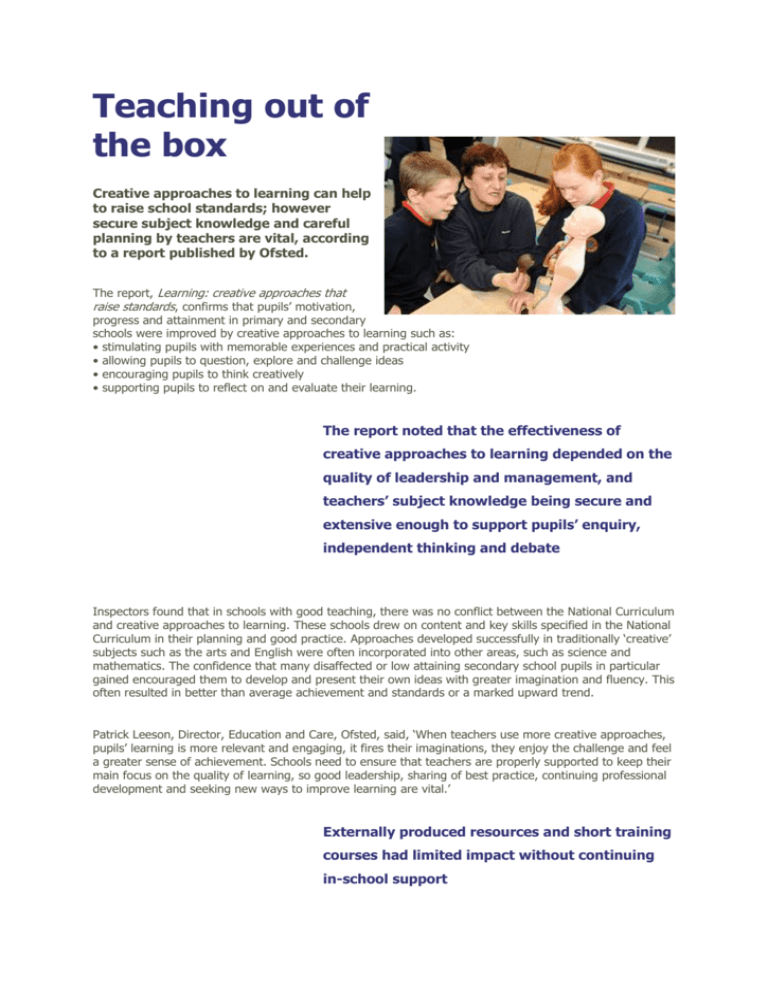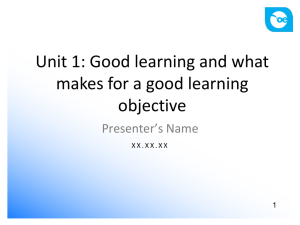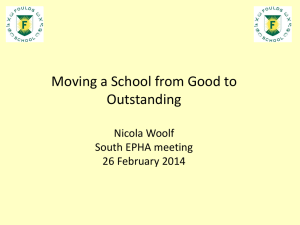Teaching out of the box
advertisement

Teaching out of the box Creative approaches to learning can help to raise school standards; however secure subject knowledge and careful planning by teachers are vital, according to a report published by Ofsted. The report, Learning: creative approaches that raise standards, confirms that pupils’ motivation, progress and attainment in primary and secondary schools were improved by creative approaches to learning such as: • stimulating pupils with memorable experiences and practical activity • allowing pupils to question, explore and challenge ideas • encouraging pupils to think creatively • supporting pupils to reflect on and evaluate their learning. The report noted that the effectiveness of creative approaches to learning depended on the quality of leadership and management, and teachers’ subject knowledge being secure and extensive enough to support pupils’ enquiry, independent thinking and debate Inspectors found that in schools with good teaching, there was no conflict between the National Curriculum and creative approaches to learning. These schools drew on content and key skills specified in the National Curriculum in their planning and good practice. Approaches developed successfully in traditionally ‘creative’ subjects such as the arts and English were often incorporated into other areas, such as science and mathematics. The confidence that many disaffected or low attaining secondary school pupils in particular gained encouraged them to develop and present their own ideas with greater imagination and fluency. This often resulted in better than average achievement and standards or a marked upward trend. Patrick Leeson, Director, Education and Care, Ofsted, said, ‘When teachers use more creative approaches, pupils’ learning is more relevant and engaging, it fires their imaginations, they enjoy the challenge and feel a greater sense of achievement. Schools need to ensure that teachers are properly supported to keep their main focus on the quality of learning, so good leadership, sharing of best practice, continuing professional development and seeking new ways to improve learning are vital.’ Externally produced resources and short training courses had limited impact without continuing in-school support The report noted that the effectiveness of creative approaches to learning depended on the quality of leadership and management, and teachers’ subject knowledge being secure and extensive enough to support pupils’ enquiry, independent thinking and debate. It was less effective where teachers lacked confidence in working creatively or were anxious about how this approach would help them meet performance targets. Good professional development within the school was a key factor in helping teachers to encourage and assess creative approaches to learning and improve their subject knowledge. Externally produced resources and short training courses had limited impact without continuing in-school support. One school visited used drumming with a Year 8 class struggling to get a firm grasp of multiplication tables. After explanation from the teacher, the students worked in groups on a drumming routine to accompany the chanting of a different multiplication table, then the results were recorded and evaluated. The pupils enjoyed the activity, and it improved their understanding of pattern and structure and their recall of multiplication tables. Inspectors found examples of productive partnerships between schools, and between schools and government-funded agencies and education foundations All the schools visited recognised the importance of assessment in creative approaches to learning. Ways of recording and evaluating pupils’ development, other than by tests at the end of a unit or a key stage, were not generally well-developed or embedded beyond the Early Years Foundation Stage. However, relatively few schools in the survey consistently tracked and evaluated small but steady improvements in a systematic and transparent way. Inspectors found examples of productive partnerships between schools, and between schools and government-funded agencies and education foundations. The involvement of practitioners such as engineers, scientists and artists was seen to strengthen links between schools and the world beyond, and to enhance pupils’ opportunities to develop as creative learners. The report, Learning: creative approaches that raise standards, can be found on the Ofsted website at www.ofsted.gov.uk/publications/080266 From ‘Ofstead News’, Issue 16. http://ofstednews.ofsted.gov.uk/article/555


![afl_mat[1]](http://s2.studylib.net/store/data/005387843_1-8371eaaba182de7da429cb4369cd28fc-300x300.png)





